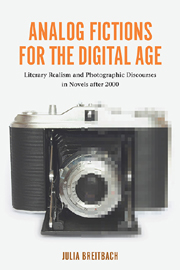 Analog Fictions for the Digital Age
Analog Fictions for the Digital Age Book contents
- Frontmatter
- Contents
- Acknowledgments
- Introduction: Toward a Photographic Reading of Literary Realism
- 1 Photography in the Digital Age: Critical Contexts and the Question of Realism
- 2 This Thing in the Text: Photography, Thing Theory, and the Return to Realism in Literature
- 3 Liminal Realism: Don DeLillo, The Body Artist (2001)
- 4 Domestic Realism: Ali Smith, The Accidental (2005)
- 5 Poetic Realism: Michael Ondaatje, Divisadero (2007)
- 6 Conclusion: The Way We Write Now—A Case for Realism(s)
- Works Cited
- Index
3 - Liminal Realism: Don DeLillo, The Body Artist (2001)
Published online by Cambridge University Press: 05 April 2013
- Frontmatter
- Contents
- Acknowledgments
- Introduction: Toward a Photographic Reading of Literary Realism
- 1 Photography in the Digital Age: Critical Contexts and the Question of Realism
- 2 This Thing in the Text: Photography, Thing Theory, and the Return to Realism in Literature
- 3 Liminal Realism: Don DeLillo, The Body Artist (2001)
- 4 Domestic Realism: Ali Smith, The Accidental (2005)
- 5 Poetic Realism: Michael Ondaatje, Divisadero (2007)
- 6 Conclusion: The Way We Write Now—A Case for Realism(s)
- Works Cited
- Index
Summary
IN HIS 2001 REVIEW OF THE BODY ARTIST, John Leonard calls Don De-Lillo a “poster boy for postmodernism.” Offering a whirlwind tour through the writer's oeuvre, Leonard writes: “[DeLillo] is the wisedup child of randomness and incongruity; the Geronimo of vandalism, bricolage, and mediascape pastiche; the conspiracy theorist of corporate power, government secrecy, malign systems, and the ‘whole enormous rot and glut and glare’ of pop culture and consumer violence; the hang-glider on waves of paranoia” (2001, 14). Such assessment can be called representative of DeLillo's canonized status as an eminent postmodernist and astute commentator on contemporary America. For the pronounced topicality of his work, particularly in his sixteen novels to date, DeLillo is usually read as a chronicler of postwar America and the postmodern condition. Since his programmatically titled first novel, Americana (1971), he has continuously added to a cinemascope panorama of the American way of life in the twentieth and twenty-first centuries. From the Kennedy assassination (Libra, 1988) to global terrorism (Mao II, 1991); from the Cold War (Underworld, 1997) to 9/11 (Falling Man, 2007); from rock circus (Great Jones Street, 1973) to New Economy hype (Cosmopolis, 2003); and from TV corporate culture (Americana) to media nausea (White Noise, 1985)—the DeLillo canon is a decade-spanning, ongoing dialogue with the ambiguities and fault lines of American culture, its “magic” and “dread” (Osteen 2000).
- Type
- Chapter
- Information
- Analog Fictions for the Digital AgeLiterary Realism and Photographic Discourses in Novels after 2000, pp. 72 - 114Publisher: Boydell & BrewerPrint publication year: 2012


